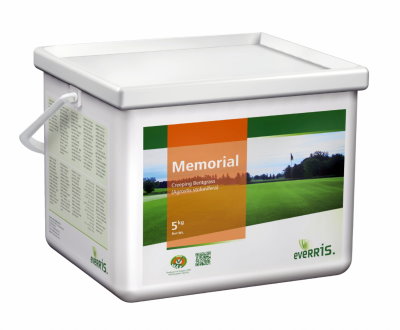
More than eight years of intensive plant breeding, selection and improvement by Everris, and the company’s predecessor, Scotts, has culminated in the launch onto the European market of Memorial, a brand new creeping bentgrass suitable for golf greens, tees and other close-mown fine turf. Memorial is recommended also for inclusion in blends for the seeding of golf course fairways.
Among the key characteristics of Memorial are excellent resistance to Dollar Spot, Microdochium (Fusarium) Patch and drought, accompanied by rapid establishment, good wear and frost tolerance, and the ability to achieve and maintain dense ground cover. Once established, Memorial is remarkably tolerant of dry, low-nutrient conditions, helping turf managers reduce input and maintenance costs.
Developed out of the acclaimed turfgrass breeding and improvement program which commenced more than 40 years ago at Rutgers University, New Jersey, USA, Memorial was one of the top-rated varieties in the Bentgrass (Greens) Tests conducted within the USA’s National Turfgrass Evaluation Program (NTEP) during the mid to late 2000s.
This program, which continues today across the United States and Canada, was established to develop and coordinate independent and uniform evaluative trials of different turfgrass varieties. The results are used by commercial companies, plant breeders and end-users to help identify, locate and select the optimum turfgrasses according to application, plant characteristics and their impact on the environment and natural resources.
Memorial was also one of eight creeping bentgrass cultivars assessed for their resistance to Dollar Spot by the O J Noer Turfgrass Research Facility, Madison, Wisconsin, USA.
Carried out over three years from 2009 to 2011, the study revealed that Memorial offers high resistance to Dollar Spot, achieving the best results in 2009 and 2010 and the second-best in the 2011 trials.
In addition to its proven resistance to a major fungal pathogen, Memorial delivers outstanding turf quality in close-mown situations, displaying an attractive medium-dark green colour, a fine leaf and low growth habit. In NTEP assessments, the quality of Memorial turf was rated among the top 25% of all entries in almost half of the locations where trials were carried out.
Supporting the case for the uptake of new turfgrass varieties by turf managers, Dr Richard Hurley of the Center for Turfgrass Science, RutgersUniversity, points out that turfgrass breeders have spent a significant amount of time developing improved creeping bentgrasses over the past three decades.
“If you select a new creeping bentgrass from a reputable breeding program you can be sure that these varieties have been thoroughly field-tested and evaluated to produce a broad genetic base,” says Dr Hurley. “Additionally, with NTEP testing conducted at twenty-two independent University sites across the US and Canada, the data confirms the enhanced qualities needed for producing a high quality bentgrass turf.”
The parent plants of future new varieties are collected primarily from mature, well-established golf courses, with material being brought back to RutgersUniversity and similar research establishments for evaluation over a number of years.
Dr Hurley commented that only the best one or two per cent of all plants will be selected for the development of a new variety. Typically, a new improved bentgrass can take ten to twelve years of breeding and selection before it is ready for commercial release for use on a golf course green, tee or fairway.
One variety that has made the grade is Memorial, which is available now from Everris distributors.
Everris Limited www.everris.co.uk

